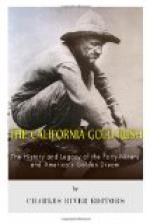Various breaches of
the peace and attacks upon citizens while in
the discharge of their
duties, specified as follows:
1. Resistance in
1853 to a writ of habeas corpus on account of
which one Roach escaped
from the custody of the law, and the infant
heirs of the Sanchez
family were defrauded of their rights.
2. An attack in 1853 on a citizen of Stockton named Evans.
3. An attack in 1853 on a citizen in San Francisco named Purdy.
4. An attack at
a charter election on a citizen of Stockton named
King.
5. An attack in
the court house of Stockton on a citizen named
Broadhouse.
Before Terry’s case came to trial it was known that Hopkins was not fatally wounded. Terry’s confidence immediately rose. Heretofore he had been somewhat, but not much, humbled. Now his haughty spirit blazed forth as strongly as ever. He was tried in due course, and was found guilty on the first charge and on one of the minor charges. On the accusation of assault with intent to kill, the Committee deliberated a few days, and ended by declaring him guilty of simple assault. He was discharged and told to leave the State. But, for some reason or other, the order was not enforced.
Undoubtedly he owed his discharge in this form to the evident fact that the Committee did not know what to do with him. Terry at once took the boat for Sacramento, where for some time he remained in comparative retirement. Later he emerged in his old role, and ended his life by being killed at the hands of an armed guard of Justice Stephen Field whom Terry assaulted without giving Field a chance to defend himself.
While these events were going forward, the Committee had convicted and hanged two other men, Hetherington and Brace. In both instances the charge was murder of the most dastardly kind. The trials were conducted with due regard to the forms of law and justice, and the men were executed in an orderly fashion. These executions would not be remarkable in any way, were it not for the fact that they rounded out the complete tale of executions by the Vigilance Committee. Four men only were hanged in all the time the Committee held its sway. Nevertheless the manner of the executions and the spirit that actuated all the officers of the organization sufficed to bring about a complete reformation in the administration of justice.
About this time also the danger began to manifest itself that some of the less conscientious and, indeed, less important members of the Committee might attempt through political means to make capital of their connections. A rule was passed that no member of the Committee of Vigilance should be allowed to hold political office. Shortly after this decision, William Rabe was suspended for “having attempted to introduce politics into this body and for attempting to overawe the Executive Committee.”




